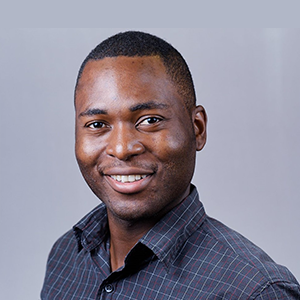In my first real US winter, I got snow;
in my second, I got a pandemic
I grew up in the tropical climate of Cameroon and later moved to Auburn, Alabama, which has similar weather patterns. I never dealt with feet of snow until the winter of 2018–2019, which I joked was my first real winter in the U.S.; 2019–2020 was my second.

Heading into the spring 2020 semester at East Stroudsburg University of Pennsylvania, I anticipated snow days with canceled classes and makeup lectures. As a second-year tenure-track assistant professor, I am still adjusting to this. To my surprise, the winter was relatively warm, with very little snow. Nearing the end of February, the university had not canceled any classes. I thought this semester was going to give me an opportunity to reevaluate my course content and delivery and make some needed changes and updates. The threat of COVID-19 appeared distant, with about 60 cases in the U.S. and none in Cameroon. I hoped this coronavirus would be contained before long.
Pennsylvania confirmed its first case of COVID-19 on March 6, a few days before our students went on spring break. Given that part of my educational background is in microbiology and infectious disease, I should have anticipated an unusual semester — but I was adamantly optimistic. I was certain that, given the relatively low number of cases at the time, they could be traced and quarantined and normalcy hopefully restored. A few days into spring break, I received an email from our provost saying the university would close and all classes would go online after the break.
I had to adjust posthaste to a new mode of course content delivery, something I did not want to be doing at a point in my career after having taught the course only once. I had to convert all my quizzes and exams for online delivery by changing the format and style of the questions. I took into account that students who suddenly found themselves stuck at home might not have the appropriate tools to draw or answer some questions online. In the late hours of the night, I made lecture videos. Sometimes I failed to hit the record button and had to start all over. I was thankful that the university gave us an extra week to convert our course material to a suitable online format. The ESU information technology and communications team offered training on online tools like Zoom and D2L, making for a relatively smooth transition and navigation.
This well-managed move to online classes, though the safest option, was a bitter pill. My students felt that they had lost their connections with the faculty. They were not used to learning from home. Immediately, as we transitioned to distance learning, grades dropped. I shared a few tips to help them adjust or avoid distractions; I suggested they try to study late at night when their homes would be quiet and calm.
As I talked with my students, I realized that learning from home was not their only new challenge. Many had to bear extra responsibilities in their households. Some had to take a job (or two) to help support their families after their parents or sponsors lost their jobs or had to stop working because underlying health conditions put them at high risk. Other students became teachers and caregivers to their younger siblings and other children at home. With these added duties, most had little time to attend an online class or even study. I addressed this by sending them links to my prerecorded videos. They could watch these at any time of the day and email me questions or meet me during online office hours. This improved student performance as it helped them to attain more work–life balance.
Teaching from home was also a challenge. As a faculty member, I am far more productive when I am on campus. Sitting at home in front of a computer all day for lectures, research and office hours is not what I envisioned for my second year. I had to make several cushion adjustments to stay comfortable in my home office setup. I take occasional walks around the living room and do stretches, pushups and other exercises between lectures and meetings to keep my mind sharp and improve blood circulation. That has become my new normal, but I miss the aroma of coffee in the university building and the hum of students chatting about how they’re looking forward to graduation or panicking about their next exam or experiment.
My family has always been a great support. With about 15,000 confirmed cases of COVID-19 as of early July (in a population of close to 27 million), Cameroon is also on lockdown. My family calls me every single day to make sure I am doing OK. With four brothers and a sister, four nephews, and two nieces, my ears are buzzing every day. They all want to talk to me, yelling and screaming at the same time. My mom (aka the General) gets especially frantic if I don’t respond immediately to her call. Thankfully, my dad (Pa Steve) is always there to calm her down. Being so far but yet feeling so close to them, and knowing they are all doing their very best to stay healthy, is to me a great blessing.
COVID-19 has given me a new perspective on all my interactions. It is a challenge to know the difficult situations my students find themselves in during this period and to be of so little help to them. I have a deeper appreciation for online teaching and communication tools such as Zoom and WebEx, though I quickly “zoom out” from attending so many virtual meetings. This has been a period of many unexpected adjustments, but each one has shown me how much I value my interactions with my students and family.
Enjoy reading ASBMB Today?
Become a member to receive the print edition four times a year and the digital edition weekly.
Learn moreFeatured jobs
from the ASBMB career center
Get the latest from ASBMB Today
Enter your email address, and we’ll send you a weekly email with recent articles, interviews and more.
Latest in Careers
Careers highlights or most popular articles

Upcoming opportunities
Just added: Nominations are being accepted for FASEB's Excellence in Science Awards! Plus: Remember to register for the ASBMB Deuel conference, a must-attend event for lipids investigators.

Balancing research and classes in graduate school
Our careers columnist talks to a doctoral candidate about managing lab and study time by carefully scheduling classes, getting to the lab early and “timeboxing.”

Upcoming opportunities
Friendly reminder: Early-decision abstracts for the 2025 ASBMB Annual Meeting are due by Oct. 30!


The molecular biology of commercial cannabis testing
Anthony Torres of Front Range Biosciences, explains how scientists analyze organisms growing on the plant as well as the genetic markers in cannabis DNA.

Upcoming opportunities
Register for ASBMB's Oct. 19 virtual event on AI tools and alternative assessments in BMB education, featuring a keynote lecture by Emily Ruff!

